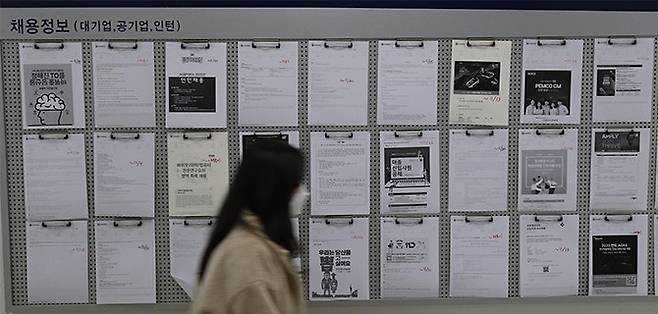Korea's 2020 job data worst since wake of 1997-1998 Asian financial crisis
이 글자크기로 변경됩니다.
(예시) 가장 빠른 뉴스가 있고 다양한 정보, 쌍방향 소통이 숨쉬는 다음뉴스를 만나보세요. 다음뉴스는 국내외 주요이슈와 실시간 속보, 문화생활 및 다양한 분야의 뉴스를 입체적으로 전달하고 있습니다.

The number of employees for the year totaled 26.9 million, down 218,000 from a year ago, Statistics Korea reported Wednesday. Korea last has seen annual payroll fall in 2009 in the wake of 2008 crisis. The dip is the biggest since 1998 after the country went under massive layoffs and restructuring in return of international bailout after the 1997 Asian financial crisis.
The only other years Korea saw a payroll decline was during the 1984 oil crisis and the 2003 credit card bubble burst.
The Korean economy lost 628,000 jobs in December from a year earlier, the sharpest drop since February 1999 when it had 658,000 fewer jobs. This marks its 10th straight month of job decline, which has continued since the beginning of the Covid-19 outbreak. This is the longest losing streak since 1998-1999 when job losses extended for 16 consecutive months.

Jobless numbers rose 45,000 to 1.1 million in 2020, the most since 2000 when statistical standards were changed to an annual basis.
The unemployment rate gained 0.2 percentage point to 4.0 percent, the highest since 2001.
The employment rate fell 0.8 percentage point to an eight-year low of 60.1 percent.
“In-person services like accommodation, retail and wholesale, and education were hit the hardest,” said Chung Dong-wook of Statistics Korea. “Employment this year will also be affected heavily by infection trends.”
After weeks of hitting record daily tallies of above 1,000, the number of new cases has stabilized to around 500 in recent days.
[ⓒ Maeil Business Newspaper & mk.co.kr, All rights reserved]
Copyright © 매일경제 & mk.co.kr. 무단 전재, 재배포 및 AI학습 이용 금지
- S. Koreans advised against overseas travel until Feb 15 - Pulse by Maeil Business News Korea
- Market Kurly projects to have achieved near $1 bn sales milestone last year - Pulse by Maeil Business News Korea
- Celltrion submits IND for Phase 3 study of Prolia biosimilar in US - Pulse by Maeil Business News Korea
- Fuel stations evolve with fast addition of EV chargers in S Korea - Pulse by Maeil Business News Korea
- SK Innovation bumps up debt offering upon 7-times oversubscription - Pulse by Maeil Business News Korea
- 강경준, 상간남 피소…사랑꾼 이미지 타격 [MK픽] - 스타투데이
- 총선은 끝났지만…부동산 ‘폭풍전야’ [COVER STORY]
- “유영재가 언니 강제추행”…선우은숙, 이혼 결심한 결정적 계기(종합)[MK★이슈] - MK스포츠
- 이찬원, 이태원 참사에 "노래 못해요" 했다가 봉변 당했다 - 스타투데이
- 양희은·양희경 자매, 오늘(4일) 모친상 - 스타투데이